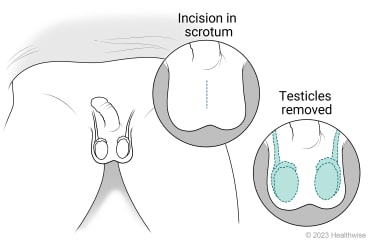
What is an orchiectomy for gender affirmation?
An orchiectomy (say "or-kee-EK-tuh-mee") for gender affirmation is surgery to remove your testicles. It can help your body match your gender identity. The surgery may also be done to remove your body's source of male hormones (testosterone). This may be the only surgery you have. Or you may have several surgeries done over time to get the results you want.
During the surgery, the doctor removes your testicles through a cut (incision) in the scrotum.
You may need to take 2 to 3 weeks off from work. It depends on the type of work you do and how you feel.
After the surgery, your body won't be able to make sperm. If there's a chance that you'll want to have biological children in the future, talk to your doctor about your options.
Talk to your doctor about the medicines and prescribed hormones you're taking. They may need to change after surgery.
After the surgery, you may go home the same day. Most people are back to their usual activities after 2 to 3 weeks. You'll need to avoid strenuous activity. Try not to strain with bowel movements or lift heavy things.
How do you prepare for surgery?
Surgery can be stressful. This information will help you understand what you can expect. And it will help you safely prepare for surgery.
 Preparing for surgery
Preparing for surgery
- Be sure you have someone to take you home. Anesthesia and pain medicine will make it unsafe for you to drive or get home on your own.
- Understand exactly what surgery is planned, along with the risks, benefits, and other options.
- If you take a medicine that prevents blood clots, your doctor may tell you to stop taking it before your surgery. Or your doctor may tell you to keep taking it. (These medicines include aspirin and other blood thinners.) Make sure that you understand exactly what your doctor wants you to do.
- Tell your doctor ALL the medicines, vitamins, supplements, and herbal remedies you take. Some may increase the risk of problems during your surgery. Your doctor will tell you if you should stop taking any of them before the surgery and how soon to do it.
- Make sure your doctor and the hospital have a copy of your advance directive. If you don't have one, you may want to prepare one. It lets others know your health care wishes. It's a good thing to have before any type of surgery or procedure.
- If you smoke, try to quit. Smoking slows healing and increases surgery risks. Your doctor may require that you quit for a period of time before and after surgery. You have the best chance for a healthy recovery if you quit smoking completely. If you need help quitting, talk to your doctor.
- Be sure to tell your doctor if you have any changes in your physical or mental health that might affect the surgery or your recovery.
What happens on the day of surgery?
-
Follow the instructions exactly about when to stop eating and drinking. If you don't, your surgery may be canceled. If your doctor told you to take your medicines on the day of surgery, take them with only a sip of water.
-
Take a bath or shower before you come in for your surgery. Do not apply lotions, perfumes, deodorants, or nail polish.
-
Do not shave the surgical site yourself.
-
Take off all jewelry and piercings. And take out contact lenses, if you wear them.
At the hospital or surgery center
-
Bring a picture ID.
-
The area for surgery is often marked to make sure there are no errors.
-
You will be kept comfortable and safe by your anesthesia provider. You will be asleep during the surgery.
-
The surgery will take about 1 hour.
When should you call your doctor?
- You have questions or concerns.
- You don't understand how to prepare for your surgery.
- You become ill before the surgery (such as fever, flu, or a cold).
- You need to reschedule or have changed your mind about having the surgery.
Where can you learn more?
Go to http://www.healthwise.net/patientEd
Enter T434 in the search box to learn more about "Orchiectomy for Gender Affirmation: Before Your Surgery".
Current as of: May 5, 2025
Author: Ignite Healthwise, LLC Staff
Clinical Review Board
All Ignite Healthwise, LLC education is reviewed by a team that includes physicians, nurses, advanced practitioners, registered dieticians, and other healthcare professionals.

